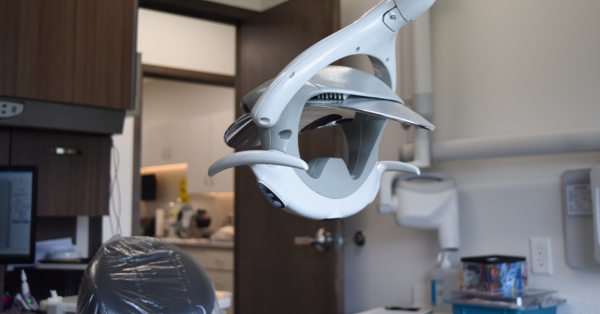
That’s a good question! But first, we’re going to do that roundabout thing where we consider other questions before circling back to our original topic. Trust us, we’ll get there!
- Why Get Your Teeth Cleaned Professionally?
Before you consider how often to have your teeth cleaned, you might be wondering why you need to have them cleaned professionally at all. After all, you’re doing all the right things. You brush twice a day for two minutes each time. You floss at least once a day. You even use a soft-bristled brush to protect your enamel. Shouldn’t this be good enough?
Conscientious dental hygiene at home is a very good thing, but, when it comes to plaque and tartar, it might not be good enough. Plaque, especially between the teeth and along the gum line, is easy to miss. In a matter of days, that overlooked plaque hardens and becomes tartar. While you can do a lot to remove food particles and plaque at home, once plaque hardens into tartar, a professional cleaning is necessary to remove it safely.
- Why Worry About Plaque and Tartar You May Have Missed?
Because you want to avoid cavities and gum disease. You know that the bacteria in plaque cause tooth decay, but did you know that plaque and tartar can be a real problem for your gum health as well? Plaque and tartar irritate delicate gum tissue, causing inflammation and gingivitis (mild gum disease). If you have chronic bad breath, if your gums are swollen, red, or painful, if your gums bleed easily when you’re brushing and flossing, you might have gingivitis.
Left untreated, mild gum disease can become periodontitis, a more serious condition. Irritation and inflammation cause gum tissue to pull away from the teeth, forming deep periodontal pockets where bacteria and infection spread. Infection and inflammation response damage the bone and tissue supporting the teeth, and teeth become loose or lost altogether. In fact, periodontal disease is the leading cause of tooth loss in adults.
A professional cleaning is one of the preventive steps you can take to reduce your risk of gum disease.
- What Happens During a Cleaning?
First, your teeth and gums will be checked carefully to see if there are any problems that your dentist needs to address before the procedure begins.
The first step in cleaning usually involves removing plaque and tartar. This may be done with an ultrasonic scaler, a hand scaler, or a combination of both. Plaque and tartar need to be scraped from tooth enamel above and below the gum line to prevent cavities and gum disease, so this is definitely a job for a dental professional. Gum attachment around the teeth will be checked, and shallow pockets will be cleaned. Your dentist will have suggestions if you have deeper periodontal pockets caused by gum disease.
After all the plaque and tartar have been removed, your teeth will be polished with a gentle abrasive to remove surface stains. There are two common methods of polishing: applying a special gritty toothpaste with a small rotating cup, or air polishing, which uses a stream of fine abrasive powder, water, and pressurized air. (If you have your teeth cleaned more than twice a year, your dentist will let you know if polishing is advisable during every visit.)
Next, flossing. A professional flossing will remove any remaining plaque from between the teeth. This is a good time to double check your own flossing technique and ask for any tips which will make your personal flossing more effective.
Finally, after rinsing, a fluoride treatment might be applied to strengthen your enamel, and you’re good to go. The entire process usually takes between 30-60 minutes.
- So, How Often Should You Have Your Teeth Cleaned?
That is a good question, and we did get there! But we don’t have just one answer for you. As with every aspect of your dental care, your dentist will recommend cleaning treatments and procedures with your specific dental needs in mind.
- If your teeth and gums are healthy, and you don’t have periodontal disease or risk factors for periodontal disease (such as smoking, a family history of gum disease, or medical conditions such as diabetes), you might be able to get by with two cleanings each year. This is something to discuss with your dentist.
- If you have a history of periodontal disease, or are at higher risk for periodontal disease because of one or more risk factors, your dentist might recommend more than two cleanings each year.
If you suffer from gum disease, a regular cleaning might not be enough. In this case, Doctors Bauer, Lawrenz, and Stark, a specialist in treating conditions of the gums, bones, and tissues surrounding the teeth, can perform a more thorough deep cleaning. This procedure is non-surgical, and makes use of two types of cleaning:
- Scaling, to remove bacteria, plaque, and tartar above and below the gumline.
- Planing, to smooth the roots of the teeth. This process clears away bacteria and the rough spots where bacteria collect, and provides a smooth tooth surface for gum attachment.
Because periodontal cleanings are more thorough, they can take more than one appointment at our Champlin, MN office to complete, and might require a local anesthetic. You might also be given medications to help the healing process. A follow up appointment will be scheduled to see is further treatment is necessary.
Regular professional cleanings play an important role in your preventive dental care. Whether it’s done once a year, twice annually, or more often as needed, a cleaning performed by a dental professional takes only a short amount of your time and provides you with long-term benefits—not only a brighter smile, but healthier teeth and gums!





 Website Powered by Sesame 24-7™
Website Powered by Sesame 24-7™